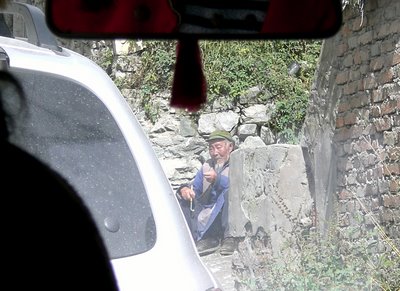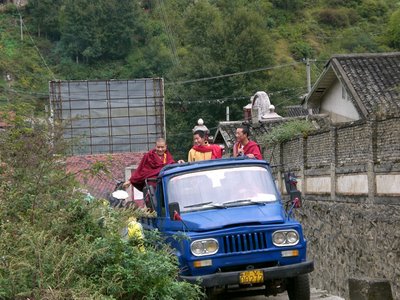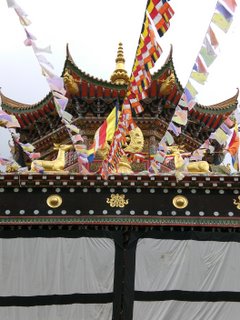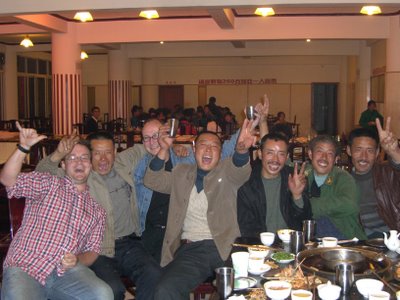The Wild West (Part Three)
 For all the planning that goes into uprooting to China or even just getting away for a few days, it’s the unplanned and unexpected things that turn out to be special. The trip to the lakes on the second day came from a chance meeting in the hostel and, looking back, I'd not have missed it for the world.
For all the planning that goes into uprooting to China or even just getting away for a few days, it’s the unplanned and unexpected things that turn out to be special. The trip to the lakes on the second day came from a chance meeting in the hostel and, looking back, I'd not have missed it for the world.
So it went with the third day too. We had climbed Paoma Shan in the morning and found ourselves at a loose end in a bar after lunch (by the way, Tibetan butter tea is probably the best drink in the world; it’s like the most comforting hot milk before you go to bed that you’ve ever had – but with the comfort factor multiplied by a hundred).
We went for a wander to the bottom end of Kangding in the vague search for a temple. “The bottom end” is probably a fitting description of south Kangding although there are plenty of apartment blocks being built there; somebody somewhere knows a good investment when they see one. Passing a group of saffron robed monks loading a truck, we headed up a bank and turned a corner to find a small hut where Buddhist nuns were turning vast prayer wheels and chanting rhythmically. A little further on was the entrance to the monastery itself.
Passing a group of saffron robed monks loading a truck, we headed up a bank and turned a corner to find a small hut where Buddhist nuns were turning vast prayer wheels and chanting rhythmically. A little further on was the entrance to the monastery itself.
Wow. A grassed courtyard is surrounded on three sides by the monks’ accommodation. Straight ahead is the business end of the monastery: rows and rows of coloured prayer flags draw your eyes toward the shrine. Huge white banners shrouded the entrance from view and the whole building was crowned by a colourful, carved roof with characteristic upward pointing eaves. Behind the curtain and in a dimly lit cloud of incense a single monk oversaw worshippers from high on the left hand side. Everything was a festival of colour: reds and golds. And dead ahead was a huge benevolent-looking Buddha figure gently welcoming you inside.
Now, I’ve not got a religious bone in my body but, as with great cathedrals, anyone can appreciate the theatricality – the sheer drama and beauty – of a place like this.
Coming out, we passed ‘The Knapsack Inn’, a hostel similar to the ‘Black Tent’ where we were staying. We thought we’d check it out and have a relaxing cup of tea in the hope of maintaining that Buddha vibe a little longer.
Just inside the gate in the yard, a Chinese couple were crouched around a ‘range’ style wood-burning stove. They invited us to sit down and have a drink. So we did. And even without talking everything just felt right. Smiles can say so much.
Monks wandered by, going to or from the temple. More smiles. Two or three more people came and sat down: one, a Canadian guy called Philippe, seemed to speak the most authentic sounding Chinese I’ve heard from a westerner and made me want to learn it even more. Chat, chat, chat; baked potatoes appeared from the stove; a spicy Sichuan sauce came from the kitchen. An American fellah, a couple of Japanese, a Brit, a Canadian and a few Kangding locals all meeting for the first ever and, no doubt, last ever time in the middle of nowhere under a beaming sun and it was perfect.
That evening, we couldn't find a place to eat. While looking though, Bick had seen a catholic church sitting incongruously on the high street and wanted a closer look. With no door at ground level we ventured up some metal steps to the side and came to what looked like a church hall – or, more specifically, a church hall cum soup kitchen. But the head man welcomed us in anyway and we found ourselves in a Sichuan ‘hotpot’ restaurant. To describe it as ‘no frills’ would be to exaggerate its sophistication but we were in now. And we were hungry.
It transpired to be the best ‘hotpot’ experience I’ve had while here. Basically you sit at a table with a gas ring in the middle in which a huge pot of boiling, spicy stock is placed. Then you drop in all kinds of wonderful things – meat, vegetables, fish – till they’re cooked through and wickedly spicy. It’s a bit of a connoisseur thing in Chengdu; here it was ‘all you could eat’ for twenty nine Yuan (just under two quid).
We ate and ate and ate. And drank. Finally we had found a place in China that used a decent sized glass for drinking beer (normally it’s served in shot glasses, would you believe? The Chinese don’t have a high tolerance for alcohol.) Then, with a glance here, a “Hallo” there, a tentative “Cheers!” or “Ganbei!” we gradually got to join the blokes at the next table. They, with hardly a word of English and we, with hardly a word of Chinese, decided a good time was common ground enough to meet on and we ended our holiday, as we began, with an accident – this time a happy one.


0 Comments:
Post a Comment
Subscribe to Post Comments [Atom]
<< Home